|
|
|
Sort Order |
|
|
|
Items / Page
|
|
|
|
|
|
|
| Srl | Item |
| 1 |
ID:
061979
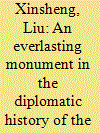

|
|
|
| 2 |
ID:
145522
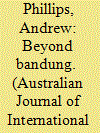

|
|
|
|
|
| Summary/Abstract |
The special issue this article opens examines the systemic impact, limits, achievements and legacies of the 1955 Asian-African ‘Bandung’ Conference. The Bandung conference is typically celebrated as a high point of Indonesian foreign policy activism and a key milestone in the emergence of the ‘Third World’. By contrast, mainstream international relations has paid comparatively less attention to its broader impact in the evolution of the modern international order. The special issue contributors here seek to correct this lacuna by interrogating Bandung’s significance in challenging, affirming and amending key aspects of the post-war global order. They also consider its relevance in setting important precedents that simultaneously foreclosed and enabled different manifestations of South–South cooperation thereafter. Beyond its historical significance, they finally explore Bandung’s enduring legacies for both domestic Indonesian order-building projects and Indo-Australian efforts to bridge the ‘Bandung divide’ in their responses to contemporary threats to international order. This article opens this inquiry by historically situating Bandung within its broader global context, unpacking its four ‘faces’ (order-challenging, order-affirming, order-building and order-transforming) and finally delineating the key axes of debate around which this special issue is organised.
|
|
|
|
|
|
|
|
|
|
|
|
|
|
|
|
| 3 |
ID:
145528
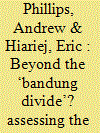

|
|
|
|
|
| Summary/Abstract |
Despite sharing many strategic interests, Indonesia and Australia have often struggled to forge effective security cooperation. In this article, the authors evaluate the ‘Bandung divide’ as a potential explanation for this difficulty. The ‘Bandung divide’ refers to the legacies of the 1955 Asian-African Conference, which saw Indonesia and Australia adopt different normative orientations towards the liberal international order, and divergent security strategies for South-East Asia. Having sketched the contours of the ‘Bandung divide’ and established its heuristic utility as a shorthand for the two countries’ divergent approaches to international order and regional security, the authors then evaluate its contemporary significance as a barrier to bilateral security cooperation in relation to two key challenges: Chinese revisionism in the South China Sea and transnational jihadist terrorism. Indonesia and Australia’s divergent approaches to regional security—themselves partially legacies of the ‘Bandung divide’—have prevented meaningful bilateral collaboration in engaging the South China Sea dispute. By contrast, the two countries have built an effective and heavily institutionalised counterterrorism partnership, proving that the ‘Bandung divide’ is not an insuperable barrier to cooperation. The highly restrictive circumstances that made this success possible nevertheless caution against unduly optimistic assumptions that the two countries will be able to forge a more comprehensive security partnership in the foreseeable future.
|
|
|
|
|
|
|
|
|
|
|
|
|
|
|
|
| 4 |
ID:
061977
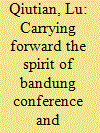

|
|
|
| 5 |
ID:
145527
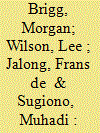

|
|
|
|
|
| Summary/Abstract |
Indonesia's normative leadership at the 1955 Asian-African Conference was grounded in anti-colonialism that became part of the ‘Bandung spirit’. However, the shape of Indonesia's recent leadership, following its remarkable democratisation, is harder to fathom. In response, this article suggests that Indonesia's regional and international engagements can be usefully understood through the lens of shifting domestic efforts to navigate unity with diversity, including as this is reflected in long-standing foreign policy commitments. Empirical reference points include the management of conflict in the Indonesian democratic transition, the place of civilian militias in Indonesian political life, and the Bali Democracy Forum. The case is made that Indonesia exhibits a remarkable embrace of diversity alongside substantial illiberality—a pattern that generates a flexible form of liberalism which presents difficulties, but also suggests particular opportunities for Indonesian leadership. Considering Indonesian navigation of unity with diversity enables a better understanding of the current and potential future shape of Indonesian leadership than analyses that rely on macro-level expectations of democratisation drawn from dominant liberal understandings of democracy and political order. This is in part because of the continuing salience of commitments to diversity, independence and cooperation that were articulated at Bandung in 1955.
|
|
|
|
|
|
|
|
|
|
|
|
|
|
|
|
| 6 |
ID:
186046
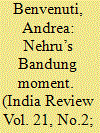

|
|
|
|
|
| Summary/Abstract |
This article explores Jawaharlal Nehru’s role in convening the 1955 Bandung Conference. Drawing upon previously embargoed Indian and Western government records, it sheds light on a largely overlooked aspect of Nehru’s Cold War diplomacy. By doing so, it shows that Nehru did not attach, at least initially, much importance to Indonesia’s calls for an Asian-African conference. Only in late 1954 did he show more interest in the Indonesian proposal. Three factors pushed Nehru in this direction: his reluctance to embarrass Indonesia, his concerns about American regional policy and his desire to exploit China’s support for peaceful coexistence. Confronted with renewed regional tensions but able to capitalize on Beijing’s new-found reasonableness, Nehru threw India’s diplomatic weight behind Indonesia’s proposal with the view to furthering his vision of “areas of peace.” Nehru’s “Bandung moment,” however, was short-lived. Although the Bandung Conference appeared to have advanced India’s national interests in the short term, its benefits were more questionable in the long run. In the end, India was unable to tie China down to its regional vision and protect itself against Chinese belligerence. Faced with a mounting Chinese challenge, Nehru’s strategy, centered upon nonaligned peaceful coexistence, manifested all its limitations.
|
|
|
|
|
|
|
|
|
|
|
|
|
|
|
|
| 7 |
ID:
145523
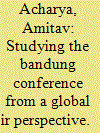

|
|
|
|
|
| Summary/Abstract |
Mainstream international relations scholarship has ignored or disparaged the significance and legacies of the Bandung conference. The author argues in favour of its importance, not only for any serious investigation into the evolution of the post-war international order, but also for the development of Global IR as a truly universal discipline: a global international relations. Few events offer more fertile ground for rethinking the established boundaries of international relations. After introducing the concept of a global international relations, the author then considers ways in which the conference’s key legacies challenge conventional accounts and attest to the ‘agency’ of the newly independent states in the making of the post-war international order. The legacies this section focuses on include frustration at Western attempts to ‘sabotage’ the conference; the delegitimisation of collective defence pacts and the development of the Non-Aligned Movement; the emergence of a South-East Asian regionalism; the strengthening of emergent global norms affirming decolonisation, human rights, universalism and the United Nations; and support for the ‘comity’, over the ‘clash’, of civilisations. The author also canvasses negative legacies of the conference, including the polarisation of Asia and the encouragement of authoritarian tendencies and regional interventionist impulses. The author concludes by drawing implications of the conference for the study of global international relations.
|
|
|
|
|
|
|
|
|
|
|
|
|
|
|
|
| 8 |
ID:
133478
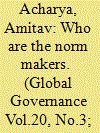

|
|
|
|
|
| Publication |
2014.
|
| Summary/Abstract |
It is increasingly recognized that the literature on norms, like that of international relations more generally, neglects or obscures the voices and role of non-Western actors. Part of the reason has to do with its relatively narrow conceptualization of agency: who are the norm makers and how do they create and diffuse norms? This article, drawing on the author's previous work on the subject, calls for a broader understanding of what norm making means and who should be considered as norm entrepreneurs. It then examines the debates and outcomes of the Asian-African Conference in Bandung in 1955 to illustrate some if not all of the key points about the normative agency of the developing countries in the construction of the postwar security order.
|
|
|
|
|
|
|
|
|
|
|
|
|
|
|
|
|
|
|
|
|